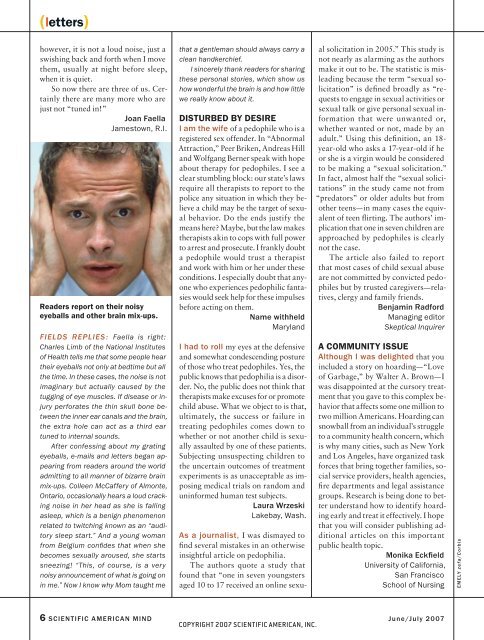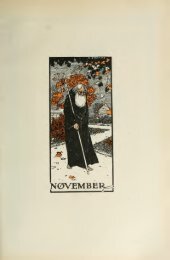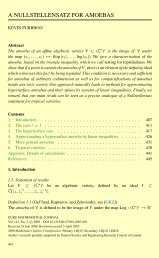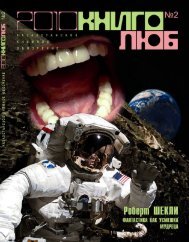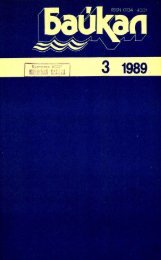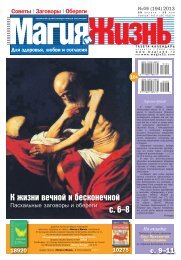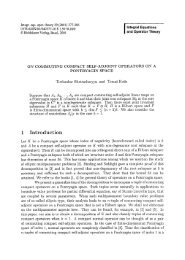Scientific American Mind-June/July 2007
Scientific American Mind-June/July 2007
Scientific American Mind-June/July 2007
Create successful ePaper yourself
Turn your PDF publications into a flip-book with our unique Google optimized e-Paper software.
(letters)<br />
however, it is not a loud noise, just a<br />
swishing back and forth when I move<br />
them, usually at night before sleep,<br />
when it is quiet.<br />
So now there are three of us. Certainly<br />
there are many more who are<br />
just not “tuned in!”<br />
Joan Faella<br />
Jamestown, R.I.<br />
Readers report on their noisy<br />
eyeballs and other brain mix-ups.<br />
FIELDS REPLIES: Faella is right:<br />
Charles Limb of the National Institutes<br />
of Health tells me that some people hear<br />
their eyeballs not only at bedtime but all<br />
the time. In these cases, the noise is not<br />
imaginary but actually caused by the<br />
tugging of eye muscles. If disease or injury<br />
perforates the thin skull bone between<br />
the inner ear canals and the brain,<br />
the extra hole can act as a third ear<br />
tuned to internal sounds.<br />
After confessing about my grating<br />
eyeballs, e-mails and letters began appearing<br />
from readers around the world<br />
admitting to all manner of bizarre brain<br />
mix-ups. Colleen McCaffery of Almonte,<br />
Ontario, occasionally hears a loud cracking<br />
noise in her head as she is falling<br />
asleep, which is a benign phenomenon<br />
related to twitching known as an “auditory<br />
sleep start.” And a young woman<br />
from Belgium confi des that when she<br />
becomes sexually aroused, she starts<br />
sneezing! “This, of course, is a very<br />
noisy announcement of what is going on<br />
in me.” Now I know why Mom taught me<br />
that a gentleman should always carry a<br />
clean handkerchief.<br />
I sincerely thank readers for sharing<br />
these personal stories, which show us<br />
how wonderful the brain is and how little<br />
we really know about it.<br />
DISTURBED BY DESIRE<br />
I am the wife of a pedophile who is a<br />
registered sex offender. In “Abnormal<br />
Attraction,” Peer Briken, Andreas Hill<br />
and Wolfgang Berner speak with hope<br />
about therapy for pedophiles. I see a<br />
clear stumbling block: our state’s laws<br />
require all therapists to report to the<br />
police any situation in which they believe<br />
a child may be the target of sexual<br />
behavior. Do the ends justify the<br />
means here? Maybe, but the law makes<br />
therapists akin to cops with full power<br />
to arrest and prosecute. I frankly doubt<br />
a pedophile would trust a therapist<br />
and work with him or her under these<br />
conditions. I especially doubt that anyone<br />
who experiences pedophilic fantasies<br />
would seek help for these impulses<br />
before acting on them.<br />
Name withheld<br />
Maryland<br />
I had to roll my eyes at the defensive<br />
and somewhat condescending posture<br />
of those who treat pedophiles. Yes, the<br />
public knows that pedophilia is a disorder.<br />
No, the public does not think that<br />
therapists make excuses for or promote<br />
child abuse. What we object to is that,<br />
ultimately, the success or failure in<br />
treating pedophiles comes down to<br />
whether or not another child is sexually<br />
assaulted by one of these patients.<br />
Subjecting unsuspecting children to<br />
the uncertain outcomes of treatment<br />
experiments is as unacceptable as imposing<br />
medical trials on random and<br />
uninformed human test subjects.<br />
Laura Wrzeski<br />
Lakebay, Wash.<br />
As a journalist, I was dismayed to<br />
fi nd several mistakes in an otherwise<br />
insightful article on pedophilia.<br />
The authors quote a study that<br />
found that “one in seven youngsters<br />
aged 10 to 17 received an online sexu-<br />
al solicitation in 2005.” This study is<br />
not nearly as alarming as the authors<br />
make it out to be. The statistic is misleading<br />
because the term “sexual solicitation”<br />
is defi ned broadly as “requests<br />
to engage in sexual activities or<br />
sexual talk or give personal sexual information<br />
that were unwanted or,<br />
whether wanted or not, made by an<br />
adult.” Using this defi nition, an 18year-old<br />
who asks a 17-year-old if he<br />
or she is a virgin would be considered<br />
to be making a “sexual solicitation.”<br />
In fact, almost half the “sexual solicitations”<br />
in the study came not from<br />
“predators” or older adults but from<br />
other teens—in many cases the equivalent<br />
of teen fl irting. The authors’ implication<br />
that one in seven children are<br />
approached by pedophiles is clearly<br />
not the case.<br />
The article also failed to report<br />
that most cases of child sexual abuse<br />
are not committed by convicted pedophiles<br />
but by trusted caregivers—relatives,<br />
clergy and family friends.<br />
Benjamin Radford<br />
Managing editor<br />
Skeptical Inquirer<br />
A COMMUNITY ISSUE<br />
Although I was delighted that you<br />
included a story on hoarding—“Love<br />
of Garbage,” by Walter A. Brown—I<br />
was disappointed at the cursory treatment<br />
that you gave to this complex behavior<br />
that affects some one million to<br />
two million <strong>American</strong>s. Hoarding can<br />
snowball from an individual’s struggle<br />
to a community health concern, which<br />
is why many cities, such as New York<br />
and Los Angeles, have organized task<br />
forces that bring together families, social<br />
service providers, health agencies,<br />
fi re departments and legal assistance<br />
groups. Research is being done to better<br />
understand how to identify hoarding<br />
early and treat it effectively. I hope<br />
that you will consider publishing additional<br />
articles on this important<br />
public health topic.<br />
Monika Eckfi eld<br />
University of California, zefa/Corbis<br />
San Francisco<br />
School of Nursing EMELY<br />
6 SCIENTIFIC AMERICAN MIND <strong>June</strong>/<strong>July</strong> <strong>2007</strong><br />
COPYRIGHT <strong>2007</strong> SCIENTIFIC AMERICAN, INC.


